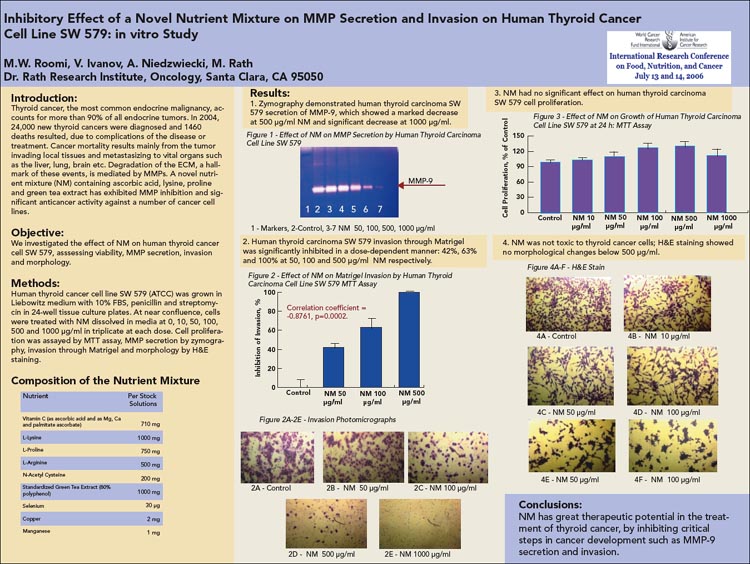M.W. Roomi, N.W. Roomi, V. Ivanov, A. Niedzwiecki and M. Rath
Dr. Rath Research Institute, Oncology Division, Santa Clara, CA 95050
Presented at:
AICR International Research Conference on Food, Nutrition and Cancer, July 13-14, 2006, Washington DC
Published in:
AICR International Research Conference on Food, Nutrition and Cancer Poster Abstract Book, Abstract #42
Abstract
Introduction:
Thyroid cancer, the most common type of endocrine malignancy, accounts for more than 90% of all endocrine tumors. In 2004, 24,000 new thyroid cancers were diagnosed and 1460 deaths resulted, due to complications of the disease or treatment. Cancer mortality results mainly from the tumor invading local tissues and metastasizing to vital organs such as the liver, lung, brain etc. Degradation of the ECM, a hallmark of these events, is mediated by MMPs. A novel nutrient mixture (NM) containing ascorbic acid, lysine, proline and green tea extract has exhibited MMP inhibition and significant anticancer activity against a number of cancer cell lines.
Objective:
We investigated the effect of NM on human thyroid cancer cell SW 579 for viability, MMP secretion, invasion and morphology.
Methods: Human thyroid cancer cell line SW 579 (ATCC) was grown in Liebowitz medium with 10% FBS, penicillin and streptomycin in 24-well tissue culture plates. At near confluence, cells were treated with NM dissolved in media at 0, 10, 50, 100, 500 and 1000 µg/ml in triplicate at each dose. Cell proliferation was assayed by MTT assay, MMP secretion by zymography, invasion through Matrigel and morphology by H&E staining.
Results:
Zymography demonstrated secretion of MMP-9, which showed a marked decrease at 500 µg/ml and at 1000 µg/ml NM. Invasion through Matrigel was inhibited at 50, 100 and 500 µg/ml by 40%, 62% and 100% respectively. Interestingly NM was not toxic to the cells. H&E staining showed no morphological changes below 500 µg /ml.
Conclusions:
In conclusion, NM has a great potential for therapeutic use in the treatment of thyroid cancer, by inhibiting critical steps in cancer development such as MMP secretion and invasion.
Comment
Mortality from thyroid cancer, the most common type of endocrine malignancy, results mainly from the tumor invading local tissues and metastasizing to vital organs such as the liver, lung, and brain. Metastasis depends upon degradation of the ECM and is mediated by MMPs. A novel nutrient mixture (NM) containing ascorbic acid, lysine, proline and green tea extract has exhibited MMP inhibition and significant anticancer activity against a number of cancer cell lines. Our in vitro study on the effect of NM on thyroid cancer cells SW 579 demonstrated inhibition of invasive parameters such as MMP secretion and Matrigel invasion, without toxicity to cells, indicating NM has therapeutic potential in treatment of thyroid cancer.
